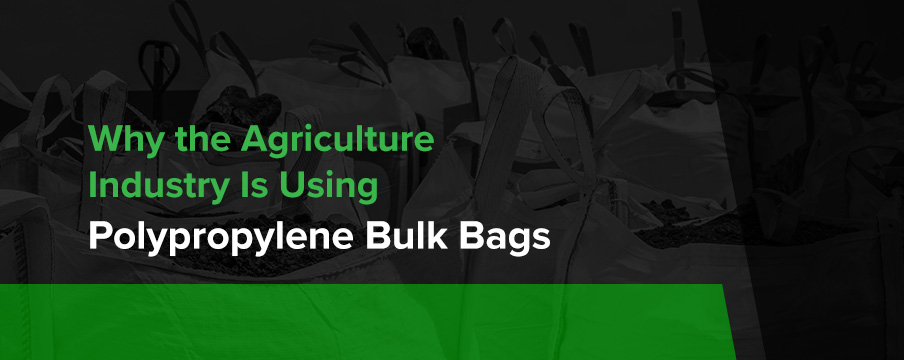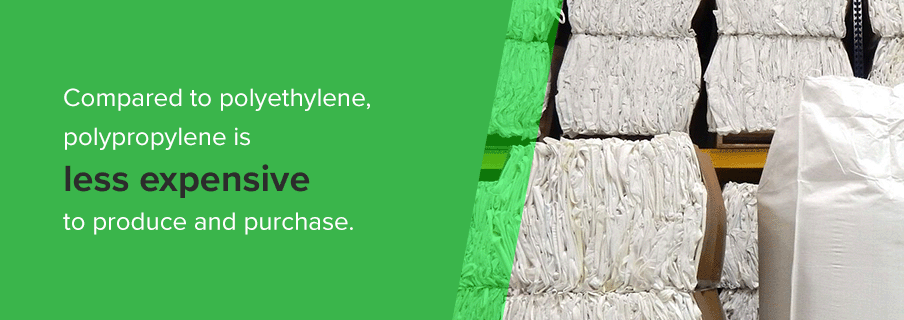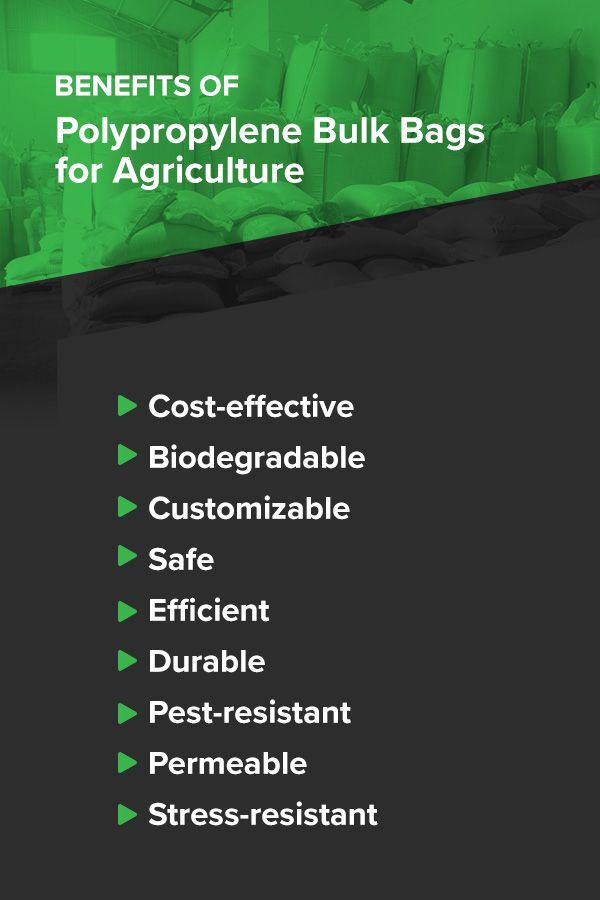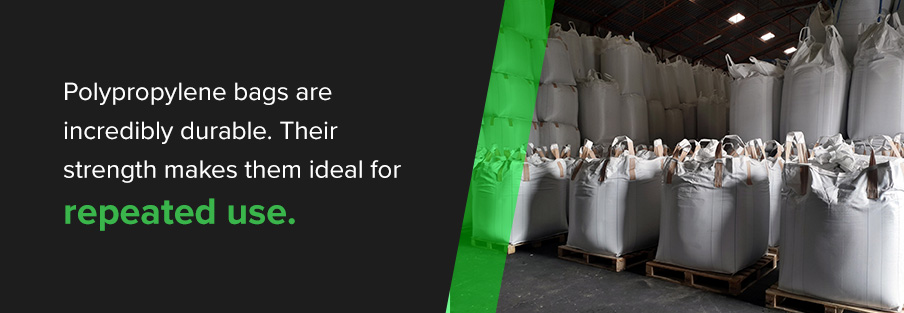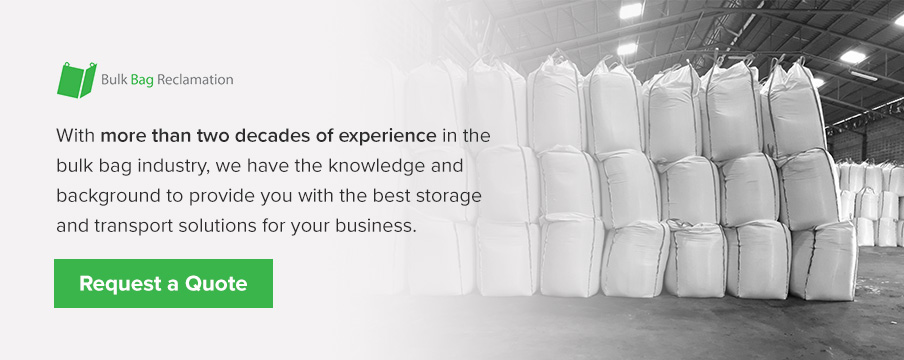As food production ramps up worldwide, the agriculture industry is working to improve its environmental impact, cost-effectiveness and operational efficiency. For many businesses, finding better storage and transport methods is a critical step toward achieving this goal.
Polypropylene bulk bags are a valuable tool for a wide range of applications in the agriculture industry, from crop storage to transportation. This post will discuss the many advantages of using polypropylene bags for your agricultural business. We’ll also explain why you should consider buying bulk bags secondhand instead of purchasing new ones. Read on for more.
What Is Polypropylene?
Polypropylene, also known as PP, is a flexible thermoplastic material created through the polymerization of propylene. The polymerization process occurs when small individual molecules called monomers chemically combine to produce larger molecules, or polymers.
Experts consider polypropylene superior to other plastic packaging materials due to its safety. Because it does not contain bisphenol A, polypropylene has a lower toxicity rating than many other plastics, making it suitable for storing food and drink products.
Some general uses of polypropylene include:
- Medicine bottles
- Drinking straws
- Yogurt cups
- Reusable shopping totes
- Athletic apparel
- Car batteries
- Syringes
One of the paramount properties of all these applications is longevity. PP is an ideal material for long-lasting products for many reasons, including its high temperature resistance, flexibility and tensile strength.
Polypropylene vs. Polyethylene
Many people compare polypropylene to another everyday plastic called polyethylene. While both plastics have similar properties, like malleability and stress resistance, they are still different compounds. Here are a few distinctions between the two.
- Clarity: Polypropylene products can be crystal-clear, whereas polyethylene products are only translucent or opaque.
- Weight: PP is lighter than polyethylene.
- Moisture control: Polyethylene is more permeable to moisture than polypropylene, making it a poor choice for food packaging.
- Cost: Compared to polyethylene, PP is less expensive to produce and purchase.
- Heat resistance: Polypropylene can withstand higher temperatures than polyethylene.
Uses of Polypropylene in Packaging and Transportation
Polypropylene is a widely used material in product packaging for many industries, including food processing, mining, automotive, fashion, construction and pharmaceuticals.
Some standard polypropylene packaging applications include the following.
- Plastic boxes: Polypropylene can repeatedly bend in the same place without cracking or breaking, making it an excellent material for boxes.
- Strapping tape: Strapping tape is similar to packing tape, but with polypropylene reinforcement. This addition makes it more applicable to heavy-duty applications like shipping large loads across the country.
- Microwaveable packaging: Due to its high temperature resistance, polypropylene is suitable for holding food during microwaving.
- Cleaning product containers: Polypropylene is highly resistant to the harsh chemicals found in household cleaning supplies, making it ideal for storing household and even industrial cleaning supplies.
More specifically, polypropylene is a practical material for many agricultural applications, including bulk bags. Their flexibility and tensile strength make them useful for carrying and storing heavy loads, from fresh produce to fertilizer.
Why Manufacturers Use Polypropylene to Make Woven FIBCs
Flexible intermediate bulk containers, also known as FIBC bulk bags, are specially designed industrial containers for storing and transporting dry and flowable products for various industries.
To make FIBCs from polypropylene, manufacturers weave strips or threads of the polymer in opposite directions. This process creates a durable, lightweight material — polypropylene fabric — perfect for storage containers.
Polypropylene is an ideal material for woven FIBCs due to its light, sturdy nature. Its low toxicity also makes it a safe choice for storing food products.
There are many other benefits to using polypropylene FIBCs as well.
- Increased safety: Moving bulk bags requires machinery, like forklifts, pallet jacks or hoists. As a result, the risk of workers injuring themselves decreases significantly.
- Financial savings: For example, consider the cost of positioning, lifting, emptying and disposing of 50 paper bags of product. It’s far more economical to use one large polypropylene bag to hold your product. You can also reuse your PP bag, whereas you’ll likely need to dispose of your paper bag.
- Economical packaging: PP bulk bags allow you to ship more for the same price, since they’re so lightweight. Storage is also more efficient because FIBCs are easier to stack and position than smaller bags.
Polypropylene Bulk Bags for Agriculture
Polypropylene bulk bags, sometimes called super sacks, are a type of woven FIBCs that are valuable for various industries.
These bags’ unique characteristics make them beneficial for use in the agricultural industry.
- Cost-effective: Polypropylene can hold more weight and last longer than other packaging materials, which means you need less of them than you would with traditional materials like paper or another plastic. You can also reuse FIBC bags until they break down, saving you money in the long run. Additionally, due to their high capacity and low weight, you can position and stack these bags more efficiently than smaller bags, maximizing your shipping load and storage space while simultaneously cutting down on related costs.
- Biodegradable: In general, polypropylene is more biodegradable than other packaging plastics. In other words, it breaks down much quicker than other materials and causes less harm to the environment. Its low toxicity means it releases fewer hazardous substances, thus preventing water table and food chain contamination.
- Customizable: You can easily custom laminate your bags to print anything from product information to your company logo directly on the bag. Depending on your application, you can also add ergonomic features like handles to make transportation and handling even easier.
- Safe: Using bulk bags in your operation can improve your business’ workplace safety. Bulk bags are compatible with most farm equipment, so your workers need to use less physical labor in moving these loads than they would if they were to lift them any other way.
- Efficient: Woven polypropylene bulk bags can easily hold loads of 2,000 to 4,000 pounds, which allows you to move more material in fewer trips. Using bulk bags can help speed up your operations.
- Durable: Polypropylene’s melting point is between 130 and 170 degrees Celsius, so it can withstand higher temperatures than other plastics, like polyethylene and polybutene, without losing its shape. It’s also highly flexible and able to expand beyond its shape without cracking or tearing. These properties make it optimal for storing and transporting food products.
- Pest-resistant: The woven design and tough composition of polypropylene bulk bags make it difficult for insects and vermin to infest the bag’s contents. Fewer losses to pests mean higher profit margins, which, in turn, means a healthier business.
- Permeable: Polypropylene is more permeable to gases than other plastics, making it more breathable. The higher airflow allows for greater moisture control, so it’s less likely bag contents will rot or develop mold in storage. Reducing waste significantly cuts down on monetary losses due to ruined products.
- Stress-resistant: Polypropylene is more resistant to extreme stressors, including electricity, harsh chemicals and physical distortions. Its sturdy, flexible nature makes it a valuable material for agricultural packaging applications.
Used Bulk Bags for Agriculture
Bulk bags help farmers collect, organize, distribute and ship their materials and crops, including everything from fresh vegetables to grains to fertilizers.
Here are some other typical reasons to use bulk bags in the agricultural industry.
- Seed: Seed is possibly the most vital material for farmers. After all, you can’t plant crops or grow food for your livestock without them. Though seeds are relatively hardy, they still need protection from moisture, heat and pests. Polypropylene FIBC bags keep vermin and environmental damage out while preserving your seed within.
- Crops: You can fill a polypropylene bag with your harvest and keep it in the same container for storage, shipping and even sale purposes. PP bags’ durable nature prevents crops from damage during transport. Even fragile items like fruits and vegetables are safe.
- Feed: Thanks to their tough exterior and low toxicity, woven polypropylene feed bags are an excellent solution for protecting livestock feed from insect infestation and spoilage.
- Fertilizer: Because bulk bags are compatible with various agricultural machines, you can make your unloading process easier and safer for field workers. Additionally, they prevent fertilizer from leaking out of the container and damaging the environment.
- Environmental initiatives: Agricultural processes naturally affect the environment in multiple ways. By replacing smaller, single-use containers in storage with heavy-duty bags you can reuse throughout each season, you can cut down on the amount of plastic waste that ends up in landfills.
Why Buy Used Bulk Bags?
If you’re accustomed to buying new bulk bags for your business, you should consider purchasing them secondhand. Using refurbished bulk bags comes with the following benefits for your business.
- Availability: Most American polypropylene distributors depend on international suppliers, so during a supply chain break or material shortage, it becomes significantly more challenging to obtain new bulk bags. The U.S. is currently experiencing this issue, so used bags are more readily available than new ones.
- Savings: If you already use bulk bags, you know you need a lot of them to keep up with your operations. And once you’ve used them, you or your customer will likely throw them away — by choosing to reuse your FIBC bags or buy them secondhand, you can save money without sacrificing value.
- Efficiency: Polypropylene bags are incredibly durable, making transporting crops and supplies easy for you and your workers. Their strength makes them ideal for repeated use — you only need to ensure they’re clean before polypropylene reuse.
- Green alternative: Producing new bulk bags releases harmful chemicals into the environment. Minimize your carbon footprint by reusing your woven polypropylene feed bags or buying used bags.
How to Choose a Used Bulk Bag Supplier
If you’re considering purchasing used bulk bags, you need to ensure you buy from a reputable source. Look out for the following qualities when evaluating different providers.
- Available materials: Make sure the supplier carries materials that suit your industry and application. For example, if you’re looking to store harvested crops, you’ll want to find bags made from nontoxic materials like polypropylene.
- Bag types: Your bulk bag’s configuration matters. Bags with handles can attach to farm equipment, making them easier and more efficient to use than bags without handles.
- Quality: What steps does the supplier take to ensure high-quality inventory? Ask about their reclamation and cleaning process, and be sure to find out what their standards are for determining whether a bag is suitable for reuse.
- Extra services: Besides selling used bags, does the supplier buy used bags from their customers? Do they refurbish or customize bags? Working with a supplier who also offers these or similar services can provide extra value to your business.
- Customer service: When you select a bulk bag supplier, you want one that cares about its clients. You should feel that your customer service representative addresses your needs quickly and efficiently. Take advantage of any trials they may offer, so you can get a feel for the company and how they operate.
At Bulk Bag Reclamation, we’re leaders in the bulk bag industry. We only sell bags that previously held dry-flow products for human or animal consumption — if a bag contained toxic chemicals or other unsafe contents, we make sure to recycle it safely and effectively.
Our inventory includes reconditioned bags in multiple configurations.
- Baffle bags: Our baffle-style bags are resilient — they retain their shape even when filled with over 2,000 pounds of material.
- Duffle-top bags: Our duffle-top bags come with wide openings, which allow you a high degree of access while simultaneously reducing mess.
- Spout-top bags: With their funnel-like openings, spout-top bulk bags help speed the process of filling hoppers and emptying contents.
- Open-top bags: You can increase manual filling efficiency and save money with secondhand open-top bags from Bulk Bag Reclamation.
If you’re interested in obtaining polypropylene bulk bags for your operation, we can help.
Contact Bulk Bag Reclamation for Used Polypropylene Bags Today
If you’re looking for a reliable agriculture bag company, Bulk Bag Reclamation is here for you. With more than two decades of experience in the bulk bag industry, we have the knowledge and background to provide you with the best storage and transport solutions for your business.
We recondition and sell used FIBC containers for a wide range of industries and applications. We also offer the following services.
- Reconditioning: You send your lightly used PP bags to us, and we’ll clean them to minimum residue standards.
- Repair: We’ll repair typical minor problems with bulk bags, such as patching small holes and replacing bottom ropes and tie strings.
- Recycling: If your bulk bags are unfit for reuse, we’ll recycle them for you.
Browse our online inventory to see our selection of used polypropylene FIBC bulk bags, and feel free to contact us for a free quote. Be sure to ask about our trial program — we can send you up to two free bulk bag samples so you can try them yourself before committing to a full purchase.

